WEST COAST MAESTRO
A feast under the baton of the inimitable Kobus van der Merwe
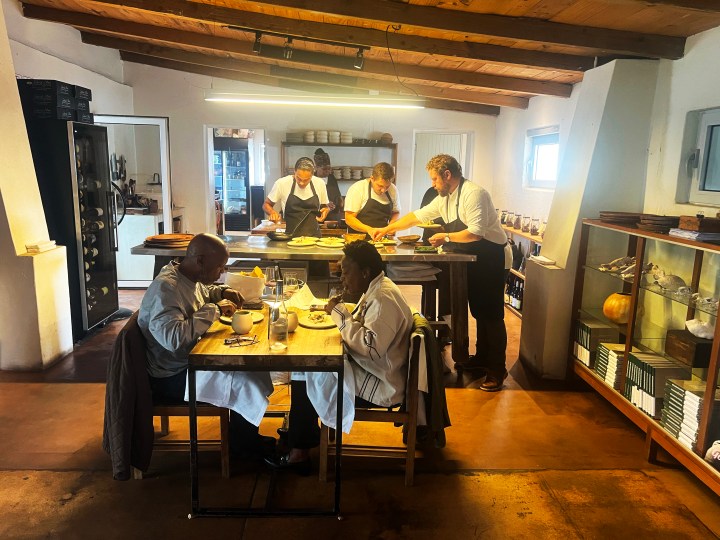
The vision and passion of one man arrested the food world five years ago. He was more surprised than anyone else. Five years later, he is still doing what he does in a truly inimitable way. There is no kitchen maestro quite like Kobus van der Merwe, the chef who wanted to be a concert pianist.
Foreign tourists walk into Wolfgat wide-eyed with expectation, the way you might walk into a room where it is said the Holy Grail might be hidden. How on earth do you meet such scary expectations? You just be yourself, because that’s what got you that award in the first place. And he does.
After finally getting to visit Wolfgat five years later, one thing is clear. Kobus van der Merwe does things in his own way, and would be doing so regardless of whether the universe chucked such a massive prize his way. [He is quick to point out that it was Restaurant of the Year, not World’s Best Restaurant.] There is nothing about him that suggests anything but being satisfied with what he does. And should anyone’s expectations not be met, I have to think: why should he even care?
He’s not doing anything differently because he won a prize.
He won a prize because he does things so astonishingly differently.
And nobody, I suspect, could match him, because to do so, they would have to be him. His cuisine is the result of his personality, his interests, his deep-rooted knowledge of all that grows and thrives in this singular terrain.
Four and a half years after he won that award, and still not having been to Wolfgat, I met Kobus when we found ourselves at the same table at the Eat Out Awards in Cape Town in November 2023. It was a meeting that was to have an impact beyond two like-minded people meeting and becoming friends. It was to trigger change in the way the awards are judged.
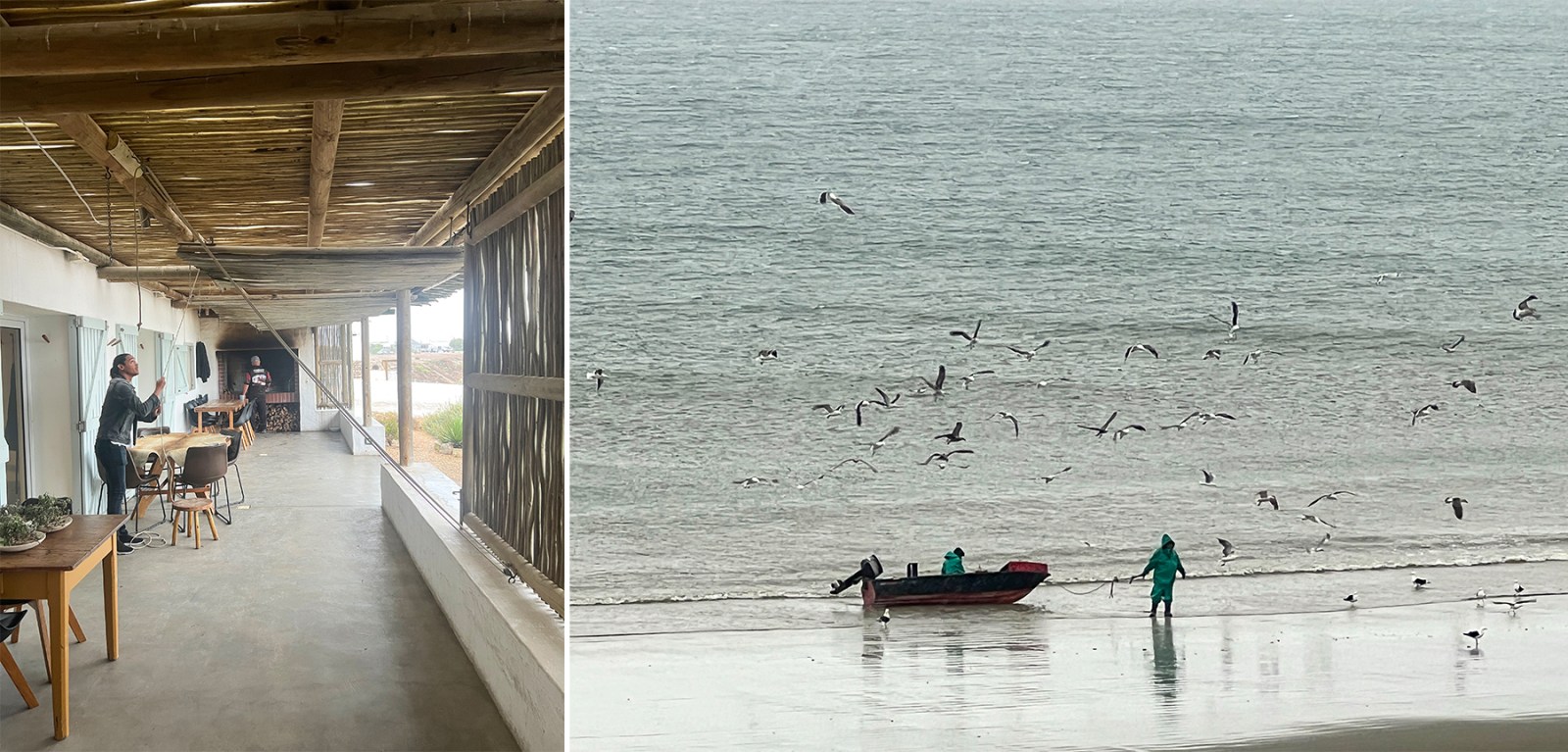
Shutters up: Emmerson Bester opens the shutters for the day’s service, and a fisher feeds the seagulls on the beach at Paternoster Bay. April 2024. (Photo: Tony Jackman)
Read more in Daily Maverick: Restaurant Awards: How can anyone who downgrades their own Restaurant of the Year be trusted?
But, really, I said to him, I need to get to Wolfgat, and he said to me, really, we need to get you to Wolfgat, and I thought to myself, I bloody need to get to Wolfgat. So, a vague plan was hatched that I would get there within the first few months of the new year. He’d show me how and where he forages. There’d be lunch and wine. Earlier this month, this finally happened.
It was pelting down when I drove into Paternoster, which I first visited in the early Eighties when it was a beautifully intact old fishing village. Kobus waved me into the driveway of his guest cottage, and within minutes we were pulling up at the door of Wolfgat.
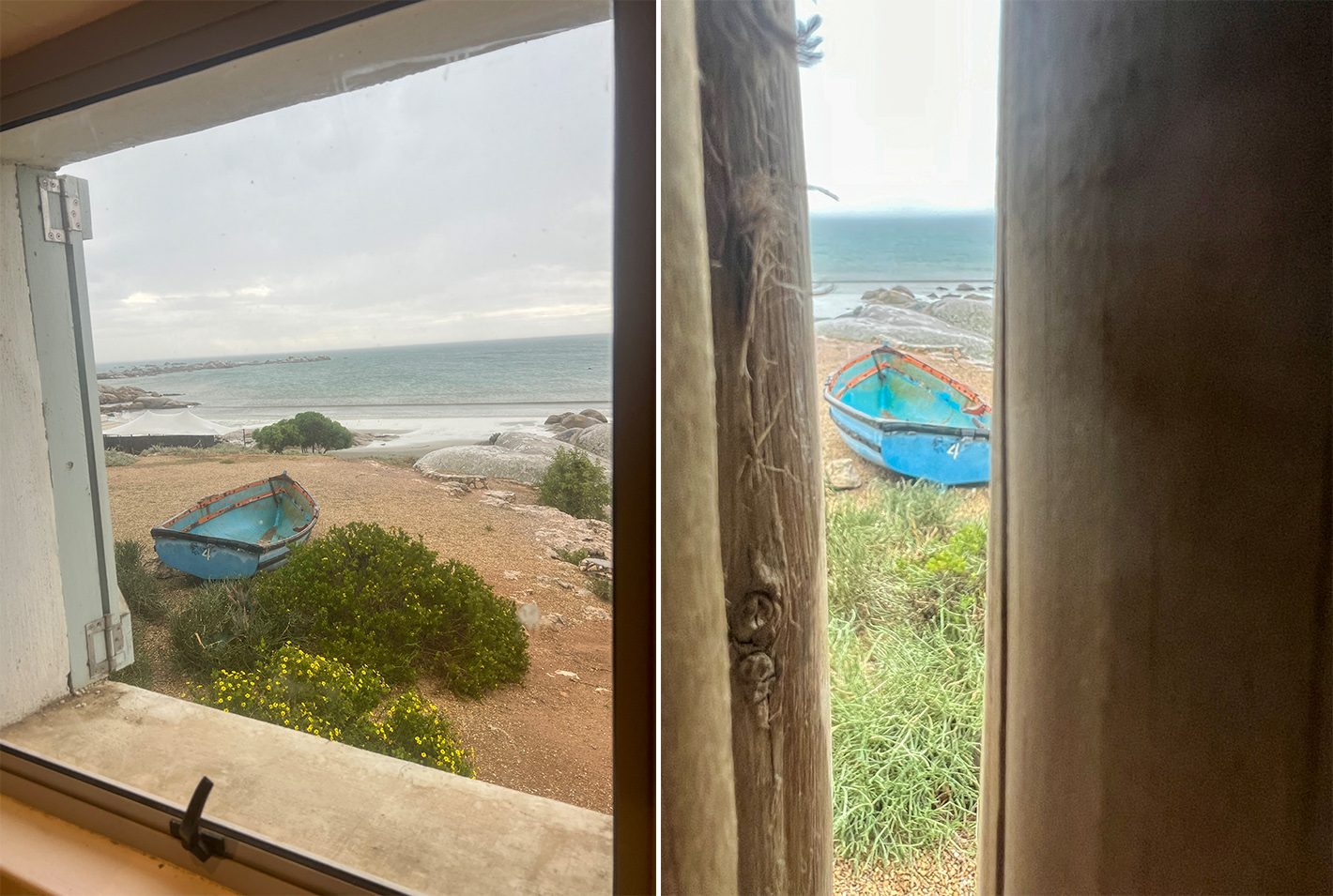
The Wolfgat boat: Crafty views of the Wolfgat rowing boat, through slats, and from a kitchen window, at Wolfgat restaurant, Paternoster. April 2024. (Photo: Tony Jackman)
My first thought on entering was that this was a welcome escape from what has happened to the old village in the intervening years. Wolfgat is an island of sanity and serenity in a fishing town desperately trying to hold on to its charm while green-eyed developers tear up the sandy soil to build as many houses as they can on the tiniest plots possible so that they can be far richer than anyone needs to be. In the shadows of this madness, a group of people put their heads down and prepare the beautiful things that will go onto our plates.
This is the old part of town, where most of the little cottages are home to fisher families and boats are parked in front of their homes as well as their cars or bakkies. In the early hours of the morning, the banter will begin as people head to the beach, having ascertained whether it was a good fishing day. But I’ve chosen a rainy day, I am missing the planned forage with Kobus. I will be back for that, we agree before the day is out. But first…
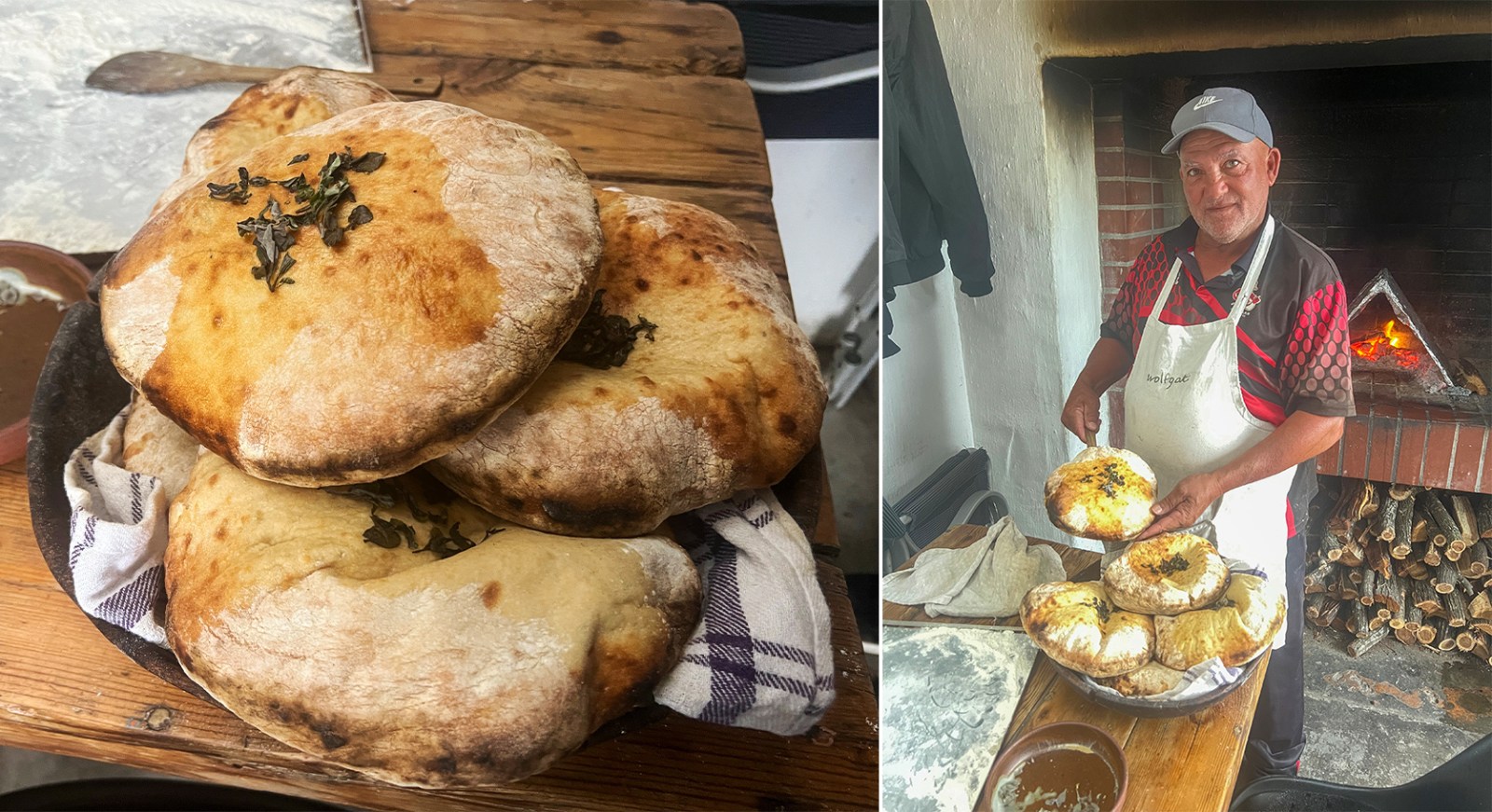
Fire man: Neville Cloete, right, with the deeply pleasing askoek sourdough he had just baked, at Wolfgat restaurant, Paternoster. April 2024. (Photo: Tony Jackman)
Oom Neville is on the stoep at Wolgat when I wander through too early on a Sunday morning, hours before service is set to start. Nobody will be dining al fresco on the stoep today, but there will be candles and gas lamps within and a sense of the winter to come. I photograph the blue rowing boat through the slats of the shutters.
There’s a twinkle in Oom Neville’s eye and the grin of the modest but happy man playing at his lip. This little stoepstorie is a typical insight into the way things are at this highly individual restaurant. Neville Cloete handles daytime security and general caretaking at Wolfgat, but he also bakes their askoek flatbread, in a makeshift triangular pizza ‘tent’ decked with tinfoil. When he’s off duty, he might be found at the Tietiesbaai jazz festival just beyond town, churning out roosterkoek. How many? “Oh, about a thousand,” he replies.
So, the first thing I learn about this former world restaurant of the year, outside of the hype and the plaudits and the craven reviews, is that Wolfgat is a family. That it is a small seaside community within a community, within which everyone has multiple roles. Every family needs a head, and Kobus conducts this orchestra like the classical pianist that he is. He is the maestro of Wolfgat.
Oom Neville’s warm hug of bread is as important to your experience as the bokkom butter made by Rochelle Karolus, the most senior chef and the “mother” of the team, who started 14 years ago as a shop assistant at Oep ve Koep, his parents Abel and Sanita’s shop. Rochelle expertly fillets the Cape bream (Kaapse galjoen) that swim abundantly in Paternoster’s bay.
Everything has a story at Wolfgat, not only the bokkom butter with its link to C Louis Leipoldt’s “smaaklike bokkom”. The bokkom butter story started at Oep ve Koep, where bokkom fillets were served according to a recipe in Leipoldt’s 1933 classic, Kos vir die Kenner. It’s simple, as are many of the great dishes of the world: bokkom fillets are fried in a little butter and served hot.
Chef Kobus explains: “The pan with bokkom-infused butter residue in which we prepared this dish became a favourite guilty staff snack in the kitchen. In the style of Scarpetta [dragging a chunk of bread through leftover pasta sauce on the plate], we would soak up the bokkom butter with pieces of freshly torn farm bread. It was so addictively delicious, we decided to share this with our guests. And so the melted bokkom butter served in a pan was born.”
On the HYM turntable perched on a cupboard to one side, where vinyl records are spun throughout service, Satchmo is rocking his soul in the bosom of Abraham when a glass of Huis van Chevallerie ‘Hummingbird’ MCC 2020 is placed before me, a dry, sea-fresh start to a fine repast a breath away from the sea.
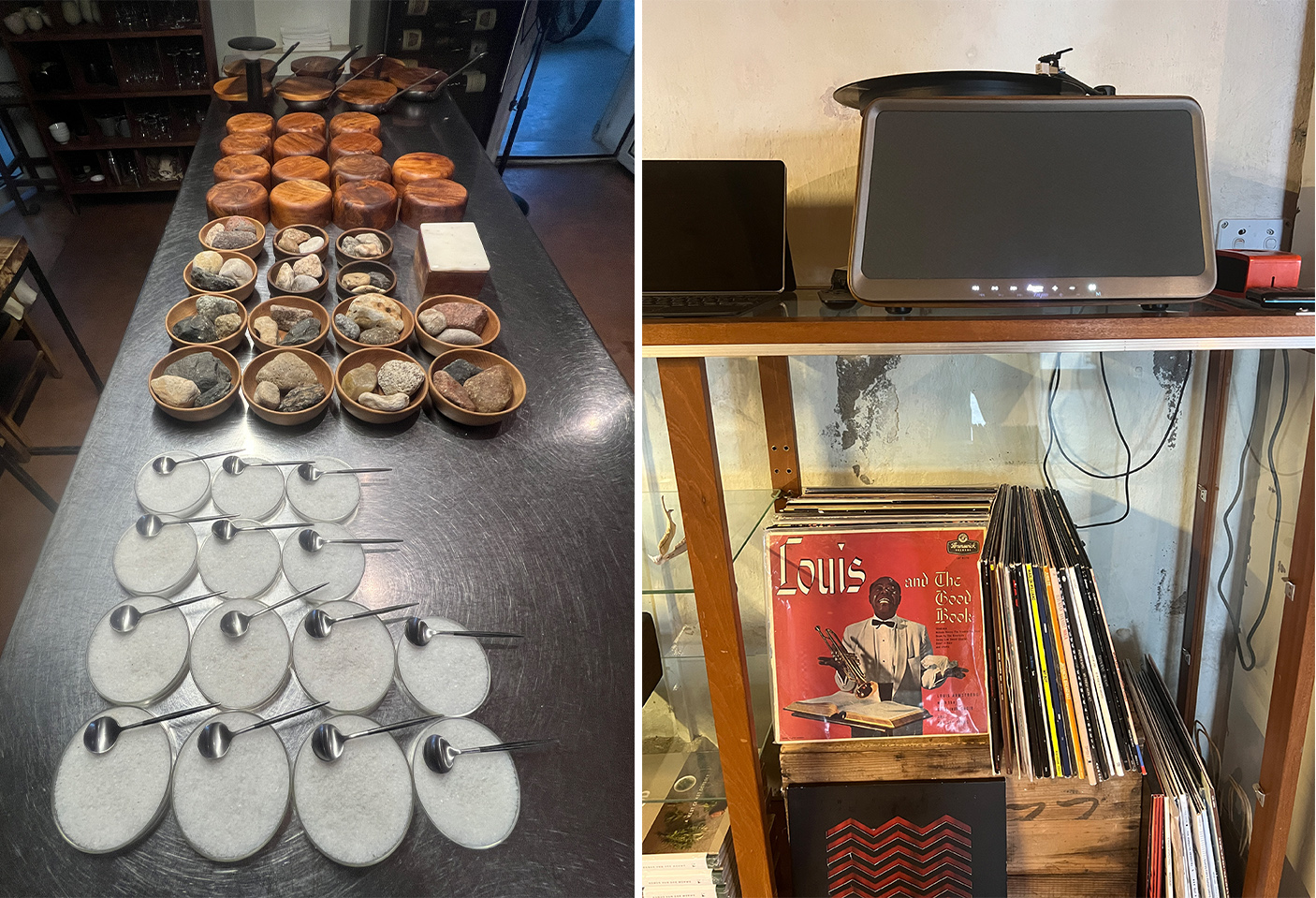
Ready for service: The pass, left, and Satchmo spins on the HYM turntable, at Wolfgat restaurant, Paternoster. April 2024. (Photo: Tony Jackman)
The “Strandveld snacks” arrive. Your first taste links you directly to the original people who called these shores their home in the coastal mists of time: limpet in its shell. On nearby Kasteelberg, archeologists have found evidence that limpets were eaten by the original inhabitants of Wolfgat cave and the broader vicinity. The limpets are cooked just the way they are in the nearby fishermen’s homes, linking the ancient past with the present.
Alicia Bester, who manages the Wolfgat scullery and takes care of the bespoke crockery, eclectic cutlery and fine stemware (when she is not picking dune spinach), minces the limpet ‘foot’ in an old-fashioned meat grinder and cooks it with butter, wine and lemon, seasoned with freshly grated nutmeg. It seems like an elixir; as though you’re nibbling on the seabed itself, on life.
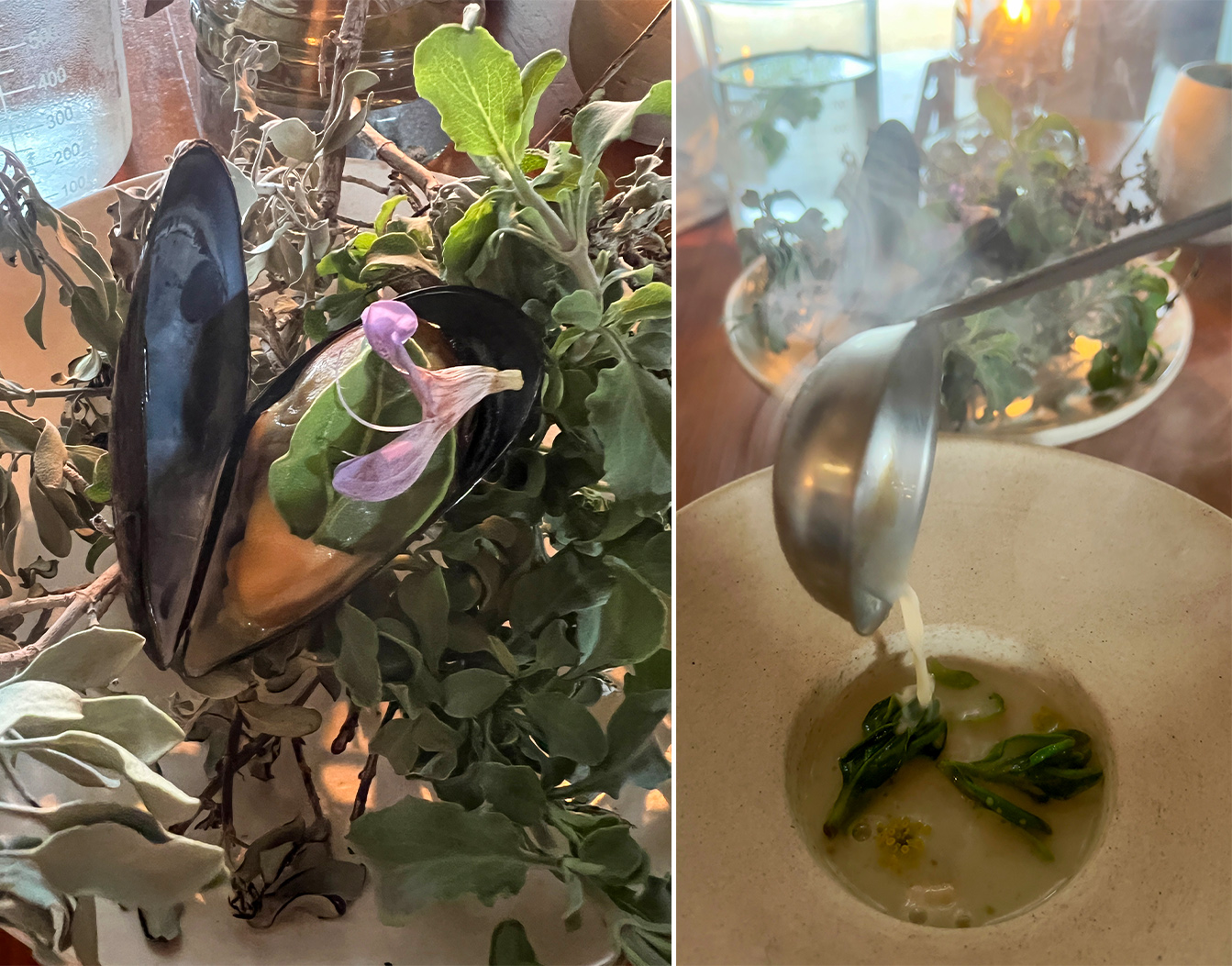
Shell & smoke: Mussels in a broth, right, and captured in smoking wild sage at Wolfgat restaurant, Paternoster. April 2024. (Photo: Tony Jackman)
Human consciousness segues between then and now to bring my mind back to its neighbours on the Strandveld snacks plate, especially a white mussel parfait that is actually green. The strapping sons of a Paternoster family wade waist-deep into the sea in wetsuits to kick up the white clams (often called white mussels) in their shells.
Alicia Bester prepares the clam parfait, and it is worthy of a Michelin star. Chef Kobus explains that it’s “finely blended into its own stock, flavoured with brandy and muscadel, baked in a bain marie with eggs and cream, then whipped into a mousse, served chilled. The white mussels produce an intensely flavourful stock. We carefully wash the white mussels to get rid of sand and grit, before processing the entire mussel, stomach and all. Guests are often surprised that the parfait is tinged green. This comes from the microalgae and plankton that the mussel filter feeds.”
The result is a fine parfait that is intentionally reminiscent of a French liver parfait in its texture. Finishing off the Strandveld snacks course is a kapokbos skewer of seared angelfish topped with nasturtium mayonnaise, seasoned with dried snoek.
The Strandveld snacks all add up: the palate is being introduced to the flavours and textures that lie ahead, starting with ‘oyster hot and cold’. I’ve seen raw heerenbone on display, and here they are on the menu as a purée.
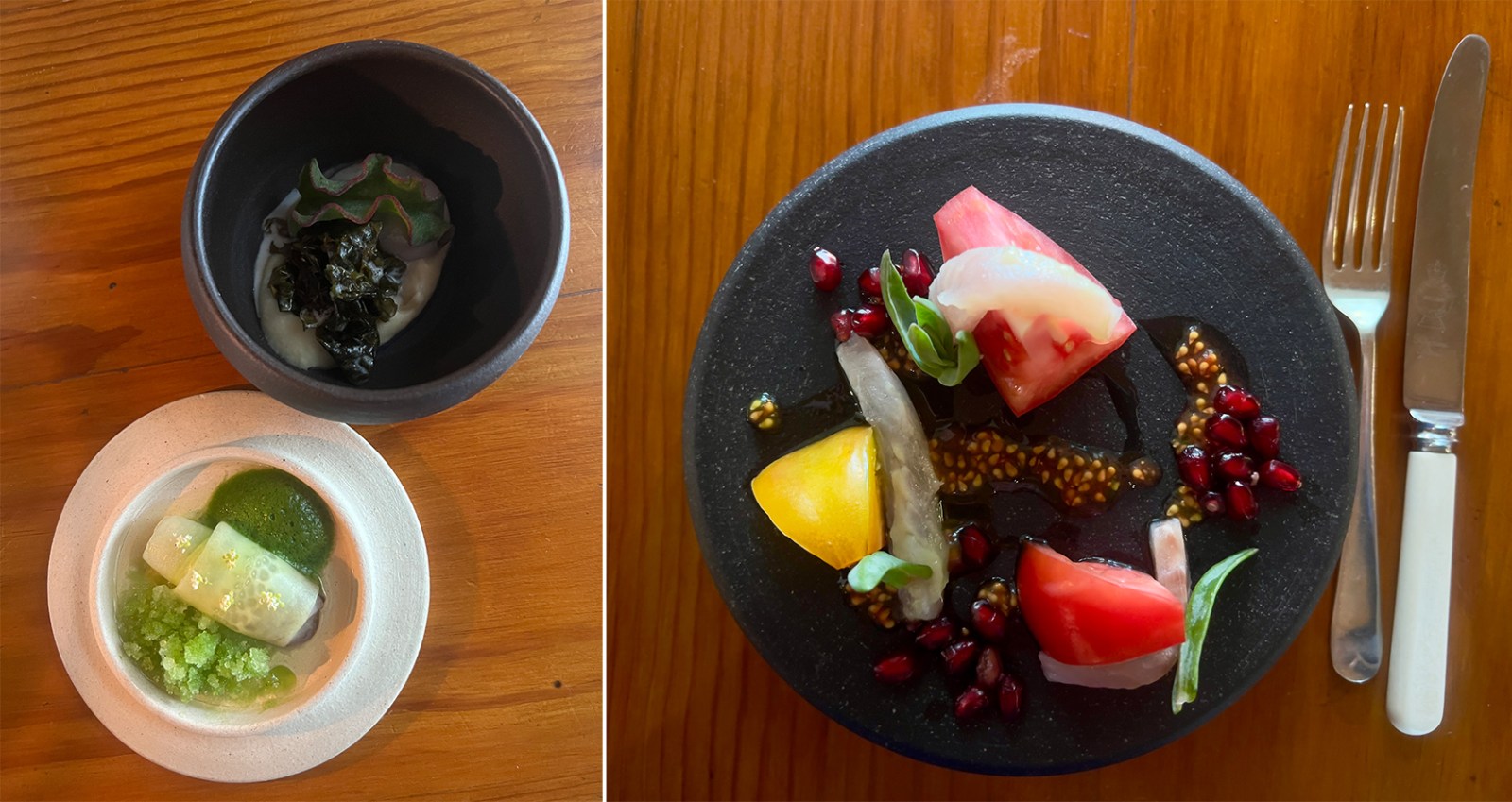
Sea fresh: Oysters, left, and Cape bream, right, at Wolfgat restaurant, Paternoster. April 2024. (Photo: Tony Jackman)
Emily Williams, who started as a waitress at Oep ve Koep and makes the sourdough bread with Oom Neville’s assistance, cooks large Saldanha Bay oysters over intensely hot coals in their shells on the braai, to be served with heerenbone purée, oven-dried klipkombers [‘stone blanket’] which Emily reconstitutes in warm cream, and soutslaai, a curly leaf picked on the beach, dunes and in the veld.
The cold aspect of the dish comprises a raw oyster in a cool blanket of marinated cucumber, with a palate-popping cucumber granita, soutslaai juice (linking the hot and cold dishes), Namibian !nara oil, and dune celery. Kobus’s carefully paired wine for these hot and cold contrasts is Gedeelte Palomino 2022, from the winery closest to Wolfgat, cooled by strong maritime breezes only 4km from the sea.
Earlier I spotted Derek Shaw, the newest member of the team, slicing the small Cape bream that populate the bay and the kelp forests of the West Coast, which is “perfect for serving raw”, says Van der Merwe. Shaw is also the main forager, though everyone mucks in (Rochelle picks bietou flowers and wild fennel, She-Earl picks slangbessies and kei apples; Emmerson Bester, who does all the seaweed prep and manages the wine stock, also forages for kiesieblaar, wild sage branches, saltbush and vygie leaves and flowers. Alicia Bester harvests dune spinach.
The slivers of Cape bream are lightly cured in sea salt and ginger, then paired with late summer tomatoes, pomegranate arils and sea pumpkin leaves. The delicate white flesh of Cape Bream is perfect for serving raw, Kobus says. “Cape Bream is the species most often caught by the local small-scale fishers. In the Wolfgat cave excavation (which had early human occupation as recently as 2,000 years ago) they only found the bones of one fish species: Cape bream (Pachymetopon blochii).”
Kobus chose Mother Rock ‘Liquid Skin’ fermented chenin blanc for this dish for their slightly savoury notes that bring out the natural sweetness of the tomato.
And here comes a bit of theatre, and arguably one of the best dishes of a menu in which it is hard to pick one over the others. A bowl of smoking wild sage arrives at the table, with a mussel in its shell captured in its branches, with a secret of cape gooseberry curd inside. A second bowl contains sauteed dune spinach tips, wild mussels, and wild fennel flowers. A mussel broth is poured over at the table. Housekeeper Nosiphiwo ‘Stage’ Sagoda helps with cleaning and cooking the mussels (as well as the abalone and tjokka), while chef Kobus completes the dish by pouring mussel broth over it at the table. He chooses a young, acidic wine, Carinus Colombard 2023, to match the gooseberry in particular.
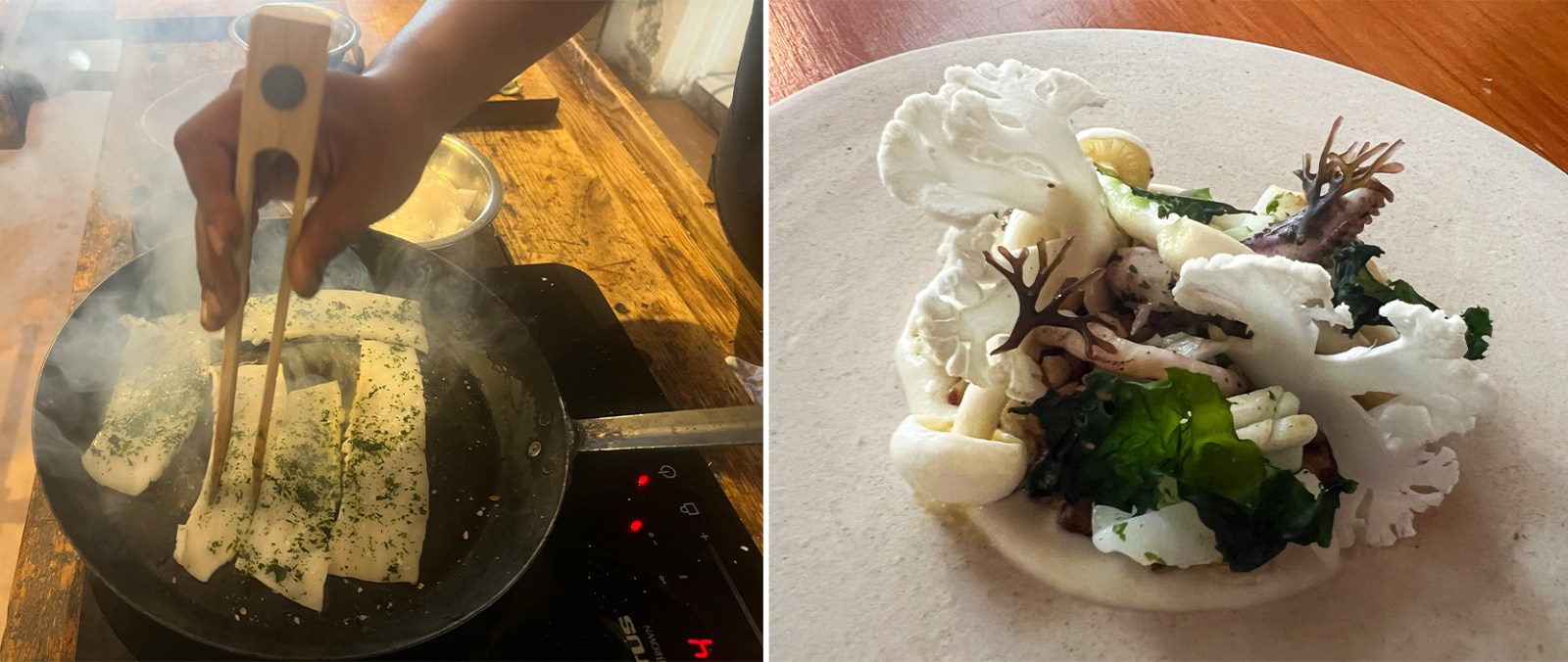
Tjokka being cooked, left, and served, right, at Wolfgat restaurant, Paternoster. April 2024. (Photo: Tony Jackman)
For the longest time, tjokka, or chokka, was used as bait off our shorelines. Calamari only started to become popular in South African restaurants in the late Seventies and early Eighties. But chef Kobus says this: “For me, our excellent local tjokka is far superior to any of the imported (and often chemically tenderised) calamari so commonplace in local eateries. We scorch-scored fillets of tjokka, as well as its tentacles, in a very hot cast iron skillet so it takes on those lovely smoky, nutty flavours.”
Between courses, I got up and snuck over to the pass where She-Earl Pietersen was cooking the tjokka (Van der Merwe’s preferred spelling) with enviable skill. So expertly scored, flash-flash, quick-quick, no messing around, then a few sprinklings of chopped dried sea lettuce, just as you might garnish fish with parsley, for a very Wolfgat touch. It’s served with cauliflower puree, toasted almonds, marinated shimeji mushrooms and thinly cut strands of kelp. The sea lettuce, says Kobus, “lends a hint of white truffle flavour”. To match, an almondy Cape Rock White 2021 from a small family winery south of Vredendal, with “some fynbos herbaceousness”.
You will wonder where the yellowtail is when this dish is served, but it is there, beneath red and green cabbage leaves and a sliver of yellow pickled onion, a hint of the derivation of the dish: pickled fish. The yellowtail is seared in “our signature wild garlic masala”, spiced with crushed Tulbaghia violacea leaves. I enjoyed this virtually as a one-bite treat, but I found the lovely yellowtail a bit lost and would have preferred it to hero the dish, rather than be subsumed by its sambals. The tantalising deliciousness of that yellowtail morsel was just gone too soon. A Lemberg Harslevelü 2021 lent its promised full-bodied roundness and a subtle spiciness that made sense.
There was a surprise course, and no, not especially for me. Everyone in the room got it; I checked. It was abalone, what a treat. The reason we had it was not the presence of moi, but of chef Richard Carstens (currently of Arkeste, Franschhoek) to celebrate his birthday the day before. And chef Kobus prepared the dish in his honour, emulating his style, as a compliment to a man who is a mentor to our Wolfgat hero. In fact, Carstens had been at that Eat Out table too, back in November.
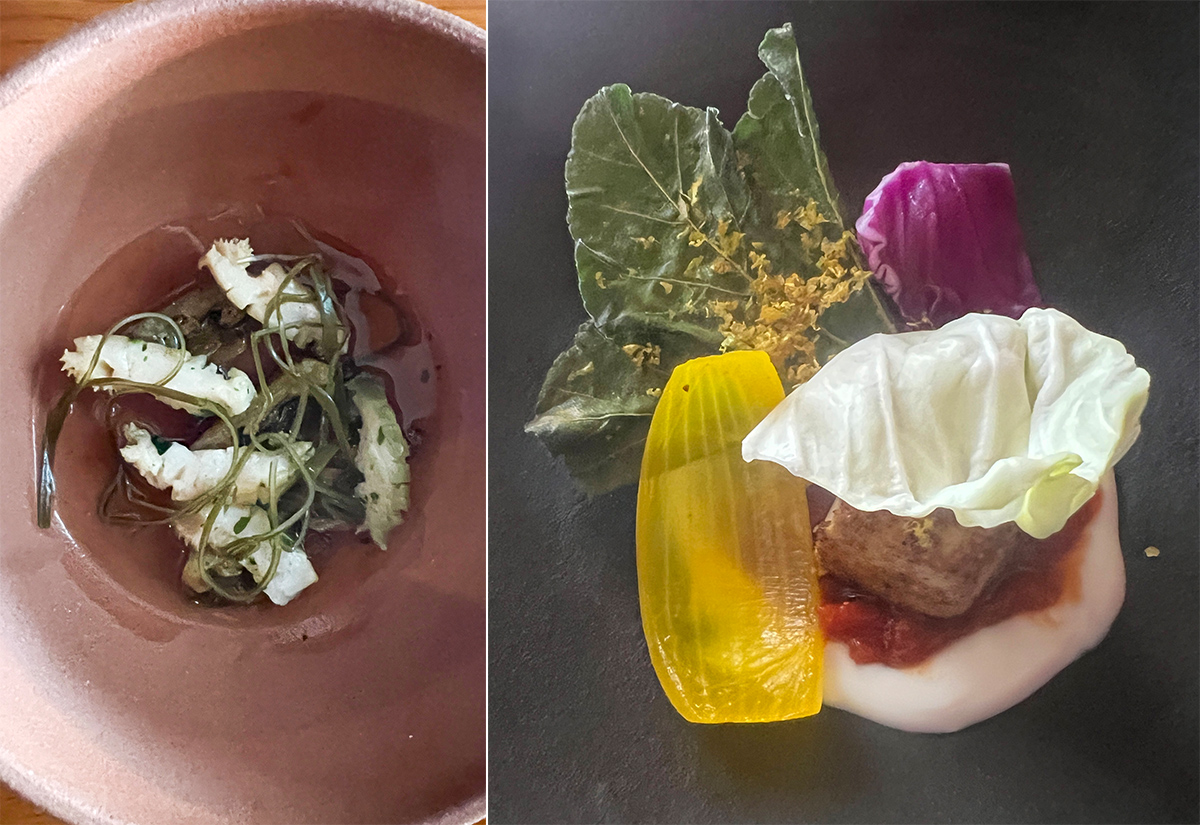
Pearly: Abalone, left, and yellowtail, right, at Wolfgat restaurant, Paternoster. April 2024. (Photo: Tony Jackman)
She-Earl Pietersen cooked strips of abalone to tender perfection. It was served in a small bowl with a bokkom dashi, in a nod to chef Richard, with braised waterblommetjie and kelp.
These were all small courses, and as can be seen, there was no meat anywhere. And there was an extra pre-dessert course too, which bridged the savoury that had gone before and the sweetness to come. Amasi sorbet was paired with beetroot, with Intellego ‘Pink Moustache’ watching dolefully over what appeared to be only a slice of beetroot.

Hmmmm: The gentleman on the label did not look overly amused. At Wolfgat restaurant, Paternoster. April 2024. (Photo: Tony Jackman)
Beneath it, though, were toasted pumpkin seeds and raw samphire, which the gentleman on the label assured me was an ideal red fruit accompaniment, “mirroring the raw and cooked beetroot flavour profile”. Or maybe Kobus said that.
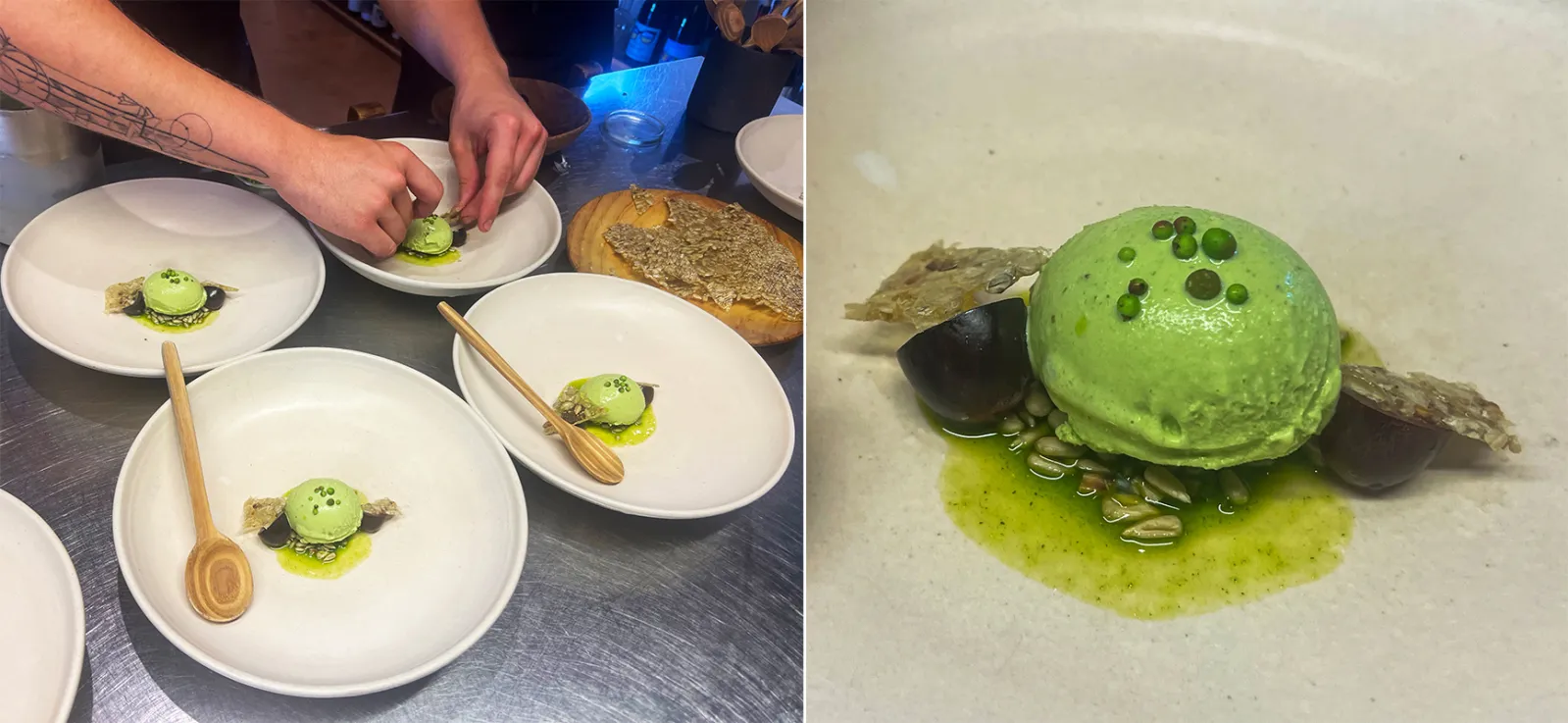
Sweet and herby: Dune crowberry ice cream being plated at Wolfgat restaurant, Paternoster. April 2024. (Photo: Tony Jackman)
The finalé was suitably light, and I was glad that it was not overly sweet. The dune crowberry ice cream couldn’t have been bettered as the swansong of a meal at this distinctive West Coast celebration of its own environment. Van der Merwe describes the crowberry leaves as tannic, and related to sumac. They’re distinctly herbaceous, perhaps a touch lemony, and blended into the ice cream base. Emily Williams, she of the oysters on the braai and the sourdough bread, is the ice cream queen too, after foraging for crowberry and pelargonium. Unripe dune crowberries adorn the dish, along with a snap of sunflower seed brittle, fresh grape, and fig leaf oil.
Seeing me off, as if I needed more wine, was The Blacksmith ‘Barebones’ methode ancestrale blend of chenin blanc and Colombard, and the latter is making a major comeback and is being seen as “the new chenin” of the local wine industry.
But chef Kobus is not finished with me yet, because here comes the digestive (or aperitif: “would you like it before or after?”) that I’d forgotten about. I’d been admiring the glass jars on a window sill near the pass earlier, just before he had rashly left me to my own devices, so that I could snoop around and get a proper feel of the place. Which I did. These were his tinctures, he said.
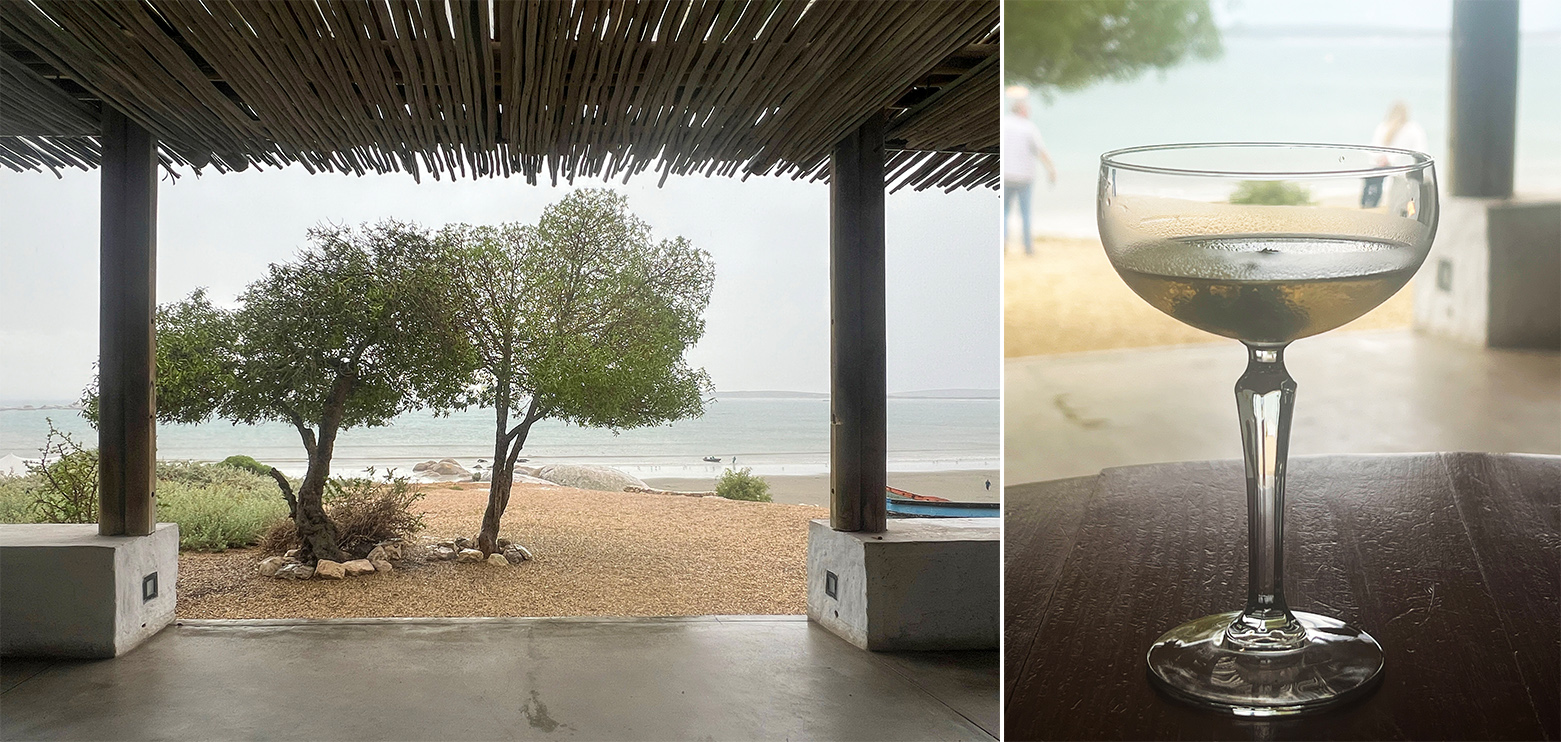
No foraging today: A rainy day at Wolfgat, left, and a delicious Wolfgat Martini, made of one part gin and one part ‘Strandveld vermouth’ made on site, at Wolfgat restaurant, Paternoster. April 2024. (Photo: Tony Jackman)
In an elegant champagne glass before me is the Wolfgat Martini; one part gin to one part ‘Strandveld Vermouth’, shaken over ice. The jars I’d been admiring, he says, are “the endemic Strandveld botanicals that we cold-extract in alcohol over four weeks to make a wild herb bitters: about 22 different aromatic fynbos plants collected around Paternoster. To make the final vermouth a base of chenin blanc is fortified with the wild herb bitters, sweetened with a drop of raw honey. The vermouth is also something we first made at Oep ve Koep. A way of channelling some of the aromatic wild plants of this region — ones that are not necessarily palatable or easily applicable in food.”
The jars, and their contents, signify the essence of Wolfgat. Unpretentious but stylish, understated but bold in what they do, all of them, from chef-conductor Kobus to every member of this remarkable orchestra, even the caretaker who cooks askoek sourdough, and the housekeeper who cooks the mussels and tjokka. I wonder if they know how good they are, and how clear it is that collectively they’re just as essential to what happens here as the sea, the sand and the ancient limpet shells that will outlast the worst machinations of the rapacious developers.
Oh, and that man wielding the baton with restraint yet somehow also aplomb. That is the fine balancing act in this man’s one-of-a-kind cuisine.
There would be nothing here without the maestro who was recognised by the world five years ago, for reasons that now make perfect sense. Yet, of whom you should have no expectations other than what he is offering: his own cuisine, on his own terms, conjured by what he and his fellow players forage and prepare for you. With one element pervading every aspect of every dish: restraint. DM





Wow, extremely well written Tony. You conjure a vivid picture of what it is like to eat at Wolfgat, with an elegant turn of phrase.
I could almost taste and smell it!